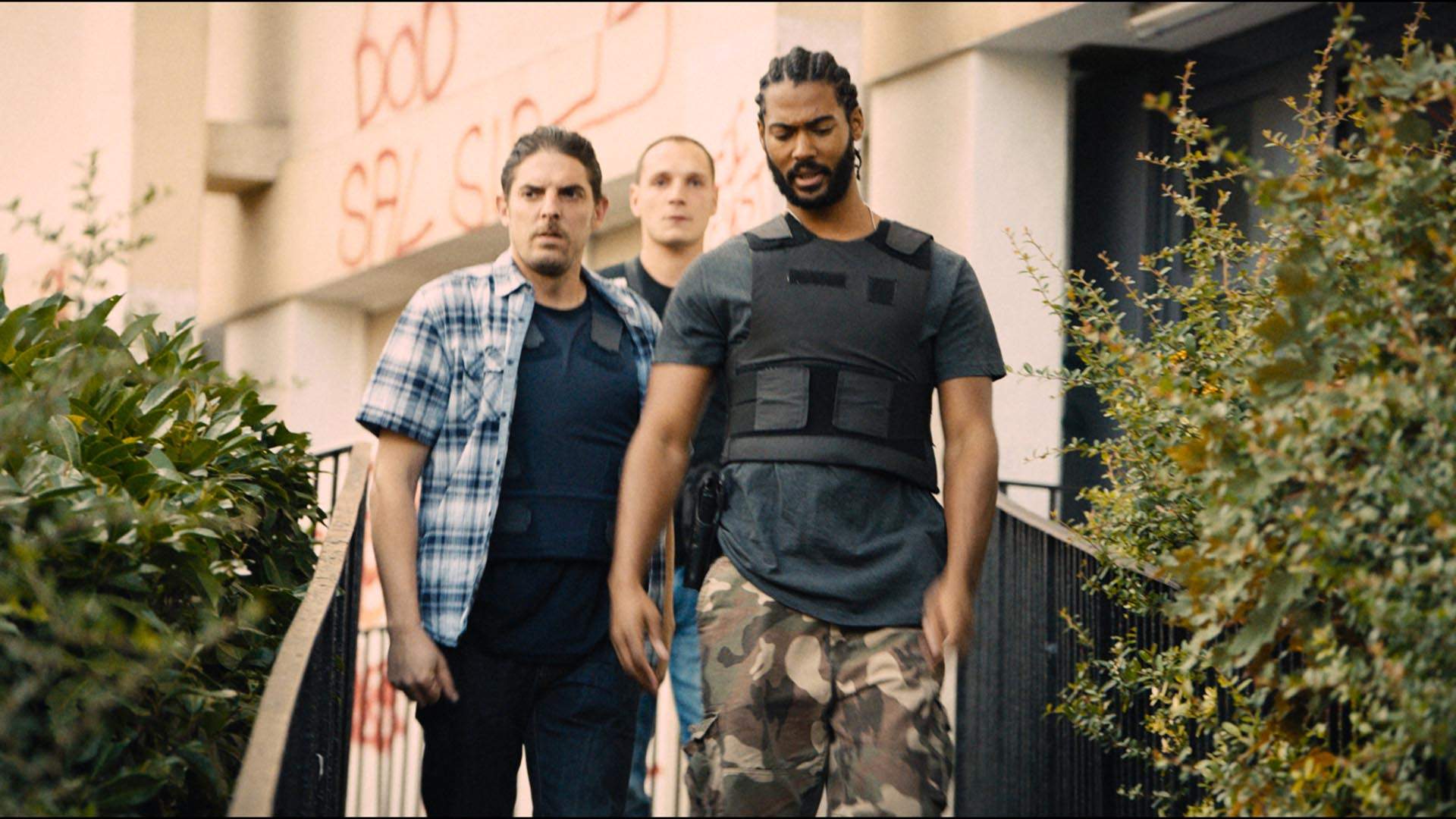The New Movies You Can Watch at Australian Cinemas From August 27
Head to the flicks to see Christopher Nolan's latest action-packed spectacle, a tense and gripping French crime-thriller or a big-budget Chinese war movie.
Something delightful is happening in cinemas across the country. After months spent empty, with projectors silent, theatres bare and the smell of popcorn fading, Australian picture palaces are starting to reopen — spanning both big chains and smaller independent sites in Sydney and Brisbane (and, until the newly reinstated stay-at-home orders, Melbourne as well).
During COVID-19 lockdowns, no one was short on things to watch, of course. In fact, you probably feel like you've streamed every movie ever made over the past three months, including new releases, comedies, music documentaries, Studio Ghibli's animated fare and Nicolas Cage-starring flicks. But, even if you've spent all your time of late glued to your small screen, we're betting you just can't wait to sit in a darkened room and soak up the splendour of the bigger version. Thankfully, plenty of new films are hitting cinemas so that you can do just that — and we've rounded up, watched and reviewed everything on offer this week.

TENET
Christopher Nolan has never made a Bond film. He certainly didn't helm The Matrix franchise, either. But pick and twist aspects of each, including narrative tropes, sci-fi trickery and special effects wizardry, and the writer/director's latest slick, bold, mind-bending action-thriller Tenet is the end product. Spy flick elements are evident from the outset, thanks to a tense, taut, supremely well-executed opening attack on the jam-packed Kiev Opera House. When a gun fires during the chaos, but the bullet returns to the weapon rather than shooting out from it, Tenet's nods to late 90s and early 00s sci-fi are apparent, too. Soon afterwards, a scientist (Clémence Poésy) talks the film's CIA operative protagonist (BlacKkKlansman's John David Washington) through some of the nuts and bolts of the shadowy situation he finds himself in, explaining that inverted objects being sent back through time from the future, that a war is coming, and detailing the reverse trajectory of the bullet — and the Protagonist, as he's literally called, exclaims a Keanu-esque "whoa!" that's particularly memorable.
Armed with the relevant background — tidbits the film wants viewers to pay close attention to as well — the Protagonist must hop around the world to stop life as everyone knows it from ending. He has suave handler Neil (Robert Pattinson) for company, but if Tenet's premise sounds a tad vague and convoluted, well, that's the movie's wavelength. As obsessed with time, space, existence and consciousness as much of Nolan's work, the cerebral feature doesn't get any less tangled or labyrinthine, or try to. It boasts the kind of plot that is actually quite straightforward, yet is told in an overly complicated fashion to keep viewers puzzling. Nolan likes messing with audiences' heads, so this shouldn't come as a surprise; however he jumps even beyond Inception's leaps, The Prestige's magic tricks and Interstellar's temporal dilations. As a result, as entertaining and downright spectacular as it is when it's at its action-packed best, there's also a sense that Tenet is bounding forward in some ways, while also needlessly looping back on itself in others. It's stirring, but also laborious. It's designed to overwhelm viewers in an inventive head trip, yet it makes the audience feel like they're working. It's intricate and exacting, and also messy and repetitive. It's a Nolan film through and through, in other words — usually to a mesmerising degree, but too indulgently as well.
Read our full review.

LES MISÉRABLES
Almost 160 years since Victor Hugo immortalised the Montfermeil commune in Les Misérables, first-time feature writer and director Ladj Ly heads there to tell a different story. Or, to be exact, his Cannes prize-winning, Oscar-nominated crime-thriller that's also called Les Misérables stops by the spot to explore comparable themes in contemporary France — and to interrogate the reality of life in the Les Bosquets housing estates in one of the capital's banlieues. The latter and their communities have featured in the likes of 1995's La Haine and 2014's Girlhood before, two hands-down French movie masterpieces, but the approach here is especially inspired. Drawing parallels with a globally known, much-adapted, long-popular classic to shine a spotlight on modern-day class and cultural clashes is smart and savvy and, in the hands of a filmmaker from the area who is already known for making documentaries about the area, results in an especially compelling and confronting piece of cinema with revolution at its heart.
Every neighbourhood bubbles with stories. So, focusing on Les Bosquets, Ly relays as many tales as he can. With propulsive and fittingly restless energy, his film flits between the locale's cops, kids and gangs — with troubles between all three groups reaching boiling point over the course of two summery and eventful days. The catalysts: familiar prejudices, long-held beefs, a stolen lion, a wrongful shooting and some controversial drone footage. The fallout: considerable. Unrelentingly terse and unafraid to filter real-world unrest through every frame, this Les Misérables is not always subtle; however, given the complicated terrain that it traverses, it needn't be. As a portrait of social tensions drawn from real-life situations, this is a movie of explosive emotional and visceral power even when it's clearly lacking in nuance. As an examination of how one event can escalate, detonate and spark a chain of chaos, and, Hugo-style, how insurrectionary acts come about, it hits hard. This definitely isn't a musical, but Ly's gripping, evocatively shot, deftly choreographed and impressively acted feature is still a rousing cinematic song of angry Parisians.
Read our full review.

THE EIGHT HUNDRED
The first Chinese film shot entirely on IMAX cameras, The Eight Hundred delivers exactly what that status demands. That'd be an impressively staged and shot spectacle, and plenty of it. Indeed, this big-budget dramatisation of the October 1937 Sihang Warehouse standoff during the Second Sino-Japanese War (which also formed part of the Second World War) is filled with fights, frays, combat and bloody confrontations to an almost relentless extent. Of course, that's the war movie formula, with the genre routinely endeavouring to steep viewers so deeply in the minutiae of the action that they feel both the mass and the personal toll. In The Eight Hundred's case, that means spending the bulk of its lengthy 147-minute duration with the 400-plus soldiers from the 524th Regiment of the National Revolutionary Army's 88th Division, who hold their ground for four days as the Imperial Japanese Army closes in on and wages an assault on the building — with the latter already overpowering Chinese forces at large during the Battle of Shanghai, and the former now representing China's last stand in the city.
Complicating matters tactically, at least for the Japanese, is the warehouse's location. Adjacent to Suzhou Creek, and therefore across from Shanghai's International Settlement, the structure is in full view of the neutral zone. For writer/director Guan Hu (Mr Six), however, that gives the film an extra opportunity to dazzle visually. On one side of the waterway sits carnage; on the other, luxury, shining lights and streets filled with well-dressed onlookers all beckon. Yes, The Eight Hundred is that blunt. Yes, it takes every opportunity to be as blatant as possible on as many levels as possible, too. This is a feature that uses a white horse galloping through the mayhem as one of its overt metaphors, after all, and deploys 'Londonderry Air', aka 'Danny Boy', as its emotive song of choice. Also among its sizeable list of heavy-handed touches: repeatedly making the case for sacrifice and bloodshed in the name of China's glory and greater good, visibly adoring solider point-of-view shots, and offering little in the way of depth amongst its heaving roster of characters. 
If you're wondering what else is currently screening in cinemas, check out our rundown of new films released in Australia on July 2, July 9, July 16, July 23, July 30, August 6, August 13 and August 20 — and our full reviews of The Personal History of David Copperfield, Waves, The King of Staten Island, Babyteeth, Deerskin and Peninsula.







